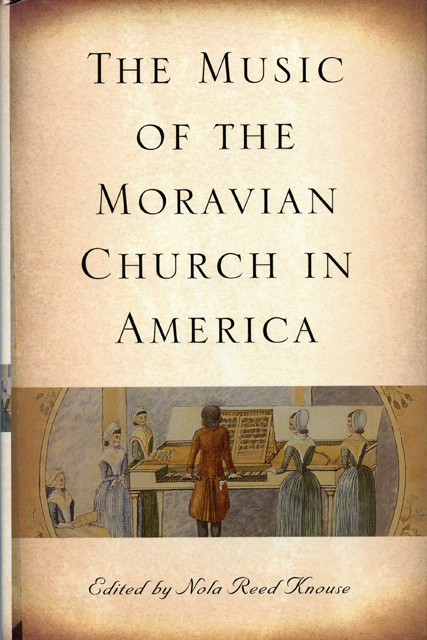Book contents
- Frontmatter
- Contents
- List of Illustrations
- Foreword
- Preface
- Acknowledgments
- 1 The Moravians and Their Music
- 2 Moravian Worship: The Why of Moravian Music
- 3 Hymnody of the Moravian Church
- 4 Moravian Sacred Vocal Music
- 5 The Organ in Moravian Church Music
- 6 The Role and Development of Brass Music in the Moravian Church
- 7 The Collegia Musica: Music of the Community
- 8 Music in Moravian Boarding Schools through the Early Nineteenth Century
- 9 The Piano among the Moravians in the Eighteenth and Nineteenth Centuries: Music, Instruction, and Construction
- 10 Moravian Music: Questions of Identity and Purpose
- Appendix 1 Biographical Sketches
- Appendix 2 A Moravian Musical Timeline
- Bibliography
- List of Contributors
- Index
- Eastman Studies in Music
Foreword
Published online by Cambridge University Press: 10 March 2023
- Frontmatter
- Contents
- List of Illustrations
- Foreword
- Preface
- Acknowledgments
- 1 The Moravians and Their Music
- 2 Moravian Worship: The Why of Moravian Music
- 3 Hymnody of the Moravian Church
- 4 Moravian Sacred Vocal Music
- 5 The Organ in Moravian Church Music
- 6 The Role and Development of Brass Music in the Moravian Church
- 7 The Collegia Musica: Music of the Community
- 8 Music in Moravian Boarding Schools through the Early Nineteenth Century
- 9 The Piano among the Moravians in the Eighteenth and Nineteenth Centuries: Music, Instruction, and Construction
- 10 Moravian Music: Questions of Identity and Purpose
- Appendix 1 Biographical Sketches
- Appendix 2 A Moravian Musical Timeline
- Bibliography
- List of Contributors
- Index
- Eastman Studies in Music
Summary
To Moravians, music carries deeper meanings than that of casual entertainment. Whether composed by Moravians or adopted into their repertoire, during half a millennium music has helped build communal identity and differentiate Moravians from their neighbors, organize the rhythm of daily life, punctuate and extend the liturgy into every waking hour, and attract others to the brethren's ways. As the following chapters explain in detail, distinctive vocal and instrumental genres give flight to spiritual sentiments that, to Moravians, transcend words alone, allowing communication plainly and directly from the heart. This immediate, heartfelt expression, especially through uncomplicated hymns within range of any voice, instills in the brethren an inner sense of heavenly harmony and thus reinforces the strong urge for social concord that once also underlay Moravian pacifism.
Although such soothing yet sometimes emotionally cathartic music provides relaxation and aesthetic enjoyment, it also imposes discipline, energizes its hearers, and sharpens the mind's focus on tasks at hand. If much Moravian church music seems simple and spontaneous, it is seldom naïve. By being readily adaptable to circumstances—as in arranging hymns for outdoor performance by brass choirs, or creating new litanies from preexisting materials—it constantly reminds congregants, no matter where they are, of Jesus’ presence, assures them that their labor and sacrifices are worthwhile, and formerly helped alleviate the anxiety experienced by children reared communally and by missionaries far from home, sometimes facing persecution and confronting hostility on Western civilization's frontiers.
Based chiefly on Jan Amos Comenius's inspirational ideals and on methods expounded by German theorists, notably Daniel Gottlob Türk (1756–1813)— whose didactic texts, well represented in Moravian libraries, remained influential far into the nineteenth century—the core Moravian repertoire has been enriched by stylistic influences of cultures from South Africa to Labrador. Hence, music among the Moravians is nothing if not eclectic and dynamic. Today as in the past, thoughtfully harmonized hymns and litanies in up-to-date as well as familiar, old-fashioned idioms, committed to memory through innumerable repetitions, reinforce faith-affirming continuity while strengthening religious purpose—the aim of all Moravian musicianship.
- Type
- Chapter
- Information
- The Music of the Moravian Church in America , pp. xi - xviPublisher: Boydell & BrewerPrint publication year: 2009

